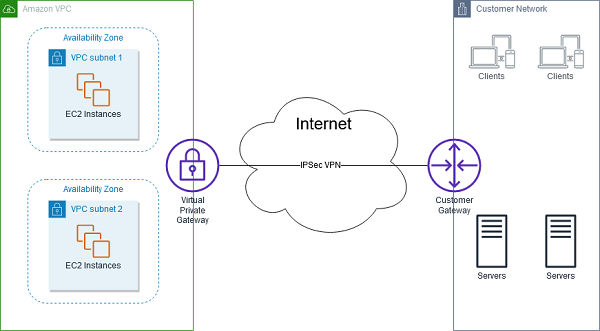
VPN¶
TLDR¶
Access AWS Ressources in one or more VPCs as if they were in your on premise network.
Design¶
- Use non overlapping ip ranges for each network
- Use Transit Gateway to increase throughput for a single site, this allow multipath routing using aditional vpn tunnelds
Options¶
AWS Managed VPN¶
- over internet
- aws managed
- use this to take advantage of aws manged services for failover and redundency
- one Virtual Private gateway to multiple Customer Gateways
Pro¶
- reuses existing vpn equipment
- reuses exisiting internet connection
- highly available
- Static routes, Border Gateway Protocol, peering and routing policies
- single VPC target
Con¶
- Network latency
- variablity
- depending on internet
- Customer managed enpoints need to implement failover manually
- Customer device needs single hop BGP
AWS Transit Gateway + VPN¶
- over internet
- aws managed
- regional router distributes traffic to different VPC
- vpc need to be in the same region
- multiple customer gatways for one AWS Transit Gateway
Pro¶
- Same as AWS Managed VPN
- additional high availabilty and scalabity
- up to 5k attachments for the transit gateway
Cons¶
- same as AWS Manged VPN
AWS DirectConnect¶
- Dedicated network connection over private lines
- Uses VirtualInterfaces in addition to customer gateway
- need multiple aws direct connect connections to support multiple customer entrypoints, but only one virtual private gateway on AWS side
- higher bandwidth
- using private ip
- 1 to 10 Gbps
- can use link aggregation group
- Use direct connect transit Gateway to connect to multiple regions or accounts or VPC
Pros¶
- More predictable Network performance
- Reduced bandwidth costs
- Support BGP peering and routing policies
Cons¶
- Requires additional telecom infrastructre
AWS Transit Gateway + AWS DirectConnect¶
- dedicated private network connection to region router which distributes the traffic to multiple vpcs
Pros¶
- Same as AWS DirectConnect
- additional high availabilty and scalabity
- up to 5k attachments for the transit gateway
Cons¶
- Same as AWS DirectConnect
AWS DirectConnect + VPN¶
- Ipsec VPN connection over private Lines
Pros and Cons¶
- all Pros and cons of AWS Mangend VPN and AWS DirectConnect
AWS DirectConnect + VPN + Transit Gatway¶
- Same as AWS DirectConnect + VPN but for up to 5k targets
AWS VPN Cloud Hub¶
- Connect remote branch offices in a hub-and-spoke model for primary or backup connectivity
- connect remote to remote to remote to vpn
Pros¶
- Reusus exsiting internet connection and AWS VPN connections
- AWS managed and highly available
- Supports BGP for exchaning routes and routing policies
Cons¶
- Network latency
- variablility and avialabilty are dependend on internet
- User managed branch office endpoints are responsible for failover implementation
Software Site to Site VPN¶
- Software applicance-based VPN connection over the internet
Pros¶
- supports wider range of VPN vendors, products and protocols
- Fully customer manged solution
Cons¶
- customer is responsible for implementing high availabilty for all endpoints
IPSec¶
- also known as Site to Site VPN
- connect to a vpc from on premise/remote
Virtual Private Gateway¶
- also known as VPN Gateway
- entrypoint to AWS VPC side of your VPN Connection
VPN Tunnel¶
- encryted link where data can pass from the customer network to, or from aws
Customer Gatway¶
- An AWS Ressource that provides Information to AWS about your Customer Gateway device
Customer Gateway Device¶
- Physical or Software
- On customer side (on premise/remote) to establish VPN connection